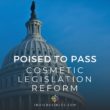I read an interesting post today at the the CPSIA Comments & Observations blog. Maintained by Richard Woldenberg, chairman of Learning Resources, a manufacturer of learning toys and hands-on classroom educational materials, the CPSIA Comments & Observations blog tracks activity with regard to the Consumer Product Safety Commission's (CPSC) implementation of the Consumer Product Safety Improvement Act of 2008 (PDF).
If you look closely at Woldenberg's post, you will see a consistent theme that boils down to these three important points.
- Consumers Matter. At the end of Woldenberg's post, he mentions how important it is for the customers of small business owners to speak out about new laws that would unnecessarily hurt the companies that make the products they love. My experience with IBN members and small businesses in general is that small companies have their customers' interests at heart. Many small businesses get their start because the owner starts creating products that are not available at “big box” stores.People like doing business with people they can relate to on a personal level. That's one reason why social media is so effective for small business owners. It is therefore important that small businesses are joined in this effort by the customers who love their products.
Consumers matter. If small businesses ask their customers to join the effort to prevent imposition of unnecessary laws, advocacy efforts are much more effective.
- Numbers Matter. If only a few people are vocal on an issue, the federal government cannot prioritize that issue. With health care, a war and the economy, the government is only going to turn its attention to priorities. They won't see something as a priority unless we do.Woldenberg's post states that one of the commissioners on the Consumer Product Safety Commission (which is considering implementation of CPSIA) said that if something was a big deal, the CPSC would have heard about it from more than just one small trade association. If true, such a statement demonstrates that one or two organizations waiving a flag is not enough.
Numbers matter. While change starts with a small number of people, it takes a village to affect an act of Congress.
- Timing Matters. While no one can say when Energy & Commerce will act to update or change HR 759, it was made clear to us last week that action is planned. If we wait too long to speak up, or never speak up, Congress will act. Once that happens, the only resource left is to do what Woldenberg is now doing: argue points before the regulator. But remember that the regulator does not make laws, it merely implements rules and regulations pursuant to those laws.Congress makes law, and once a law is passed, that's it. It's the law. Agency officials then work with industry to implement it. At that point, the options are necessarily limited by what the law says. An agency cannot do anything Congress does not first give it the power to do.
While it's important to continue to meet with agency officials, it's Congress (Energy & Commerce specifically) that is now addressing the cosmetics laws. FDA is just waiting for Congress to tell it what to do.
Timing matters. If we wait until it's in the FDA's hands alone, Congress will turn its attention elsewhere and our options will be even more limited than they are now. Your business is being discussed now. You want to be involved as that happens!
Don't Get Caught Napping!
Consumers. Numbers. Timing. Ignore any one of them at your own peril. Lets work together to ensure that any new laws advance consumer safety without diverting FDA resources from real safety issues and putting unnecessary burdens on small cosmetic manufacturers.
Question: Does the situation with CPSIA help to underscore the urgency where new cosmetics laws are concerned? Why or why not?



